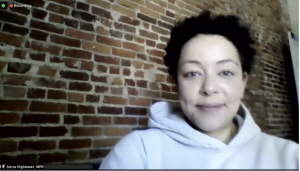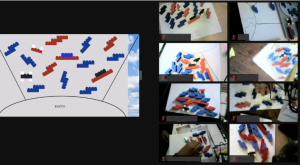In Spring of 2021, when SEED Academy was offered online due to the Covid-19 pandemic, instructors needed hands-on, engaging activities that could be delivered remotely. Through new and expanded partnerships with the Beaver Works Summer Institute, the Edgerton Center, MIT Lemelson and Biogen’s “Biogen in Action” program, and Pfizer, students learned about robotics, climate change, biological engineering and clinical trials, and stayed engaged in their STEM exploration. “We wanted to maintain the rigor of SEED Academy even though we were online,” said OEOP Manager of Programs Reimi Hicks. “And by leveraging our partners we were able to bring a little bit of MIT to our students, who were used to coming to campus every week.”
Programming autonomous cars with the Beaver Works Summer Institute
Students in the 10th grade SEED Academy Robotics class learned how to design a race course and program an autonomous car to follow a specific path within the course. This was thanks to curriculum offered by the MIT Lincoln Laboratory Beaver Works Summer Institute. The race-car program was originally developed for graduate students, but then was adapted to undergraduate and high-school levels, said Beaver Works Center Director Robert Shin. Students work in teams, advance their coding skills, and learn concepts in artificial intelligence and machine learning. And the program can be augmented by sending students hardware components like raspberry pies, he added.
“By working with the OEOP we gain high-achieving students that we could not otherwise access,” said Shin. “We teach them how to push the envelope, learn some good life lessons, and demonstrate they can achieve things that they didn’t imagine.”
As part of the partnership, SEED Academy Robotics Instructor Matthew Boyd received training prior to the start of the semester, and SEED scholars were encouraged to apply to additional Beaver Works Summer Institute programs for grades 9-11.
Learning with MIT Lemelson-Biogen
11th grade students in the SEED Academy Biological Engineering course participated in a series of webinars focused on innovation and invention in biotechnology, specifically in Alzheimer’s Disease, offered by the “Biogen In Action” program by MIT Lemelson, and Biogen Community Lab. The sessions gave students a lab-like experience, and allowed them to meet like-minded peers around the globe. In each webinar SEED scholars were joined by Biogen scholars in Brazil, Colombia and Spain.
“The key benefit of this partnership is that it exposed students to real world applications of some of the biotechnology concepts they learned in class,” said Hicks. “Our SEED Academy Biological Engineering Instructor Victor Ekuta built the curriculum around the webinars so that students could really benefit from the Biogen experience.”

Engaging with Pfizer
Two Pfizer professionals joined SEED Academy students in the spring to share their journeys in science and engineering. Sierra Hightower, Clinical Data Manager in the Neuro Pain and Rare treatment area at Pfizer, spoke to all grades about the different jobs that led her to data analysis, and her work to breakdown stereotypes around diversity in the pharmaceutical industry. Hightower is a Boston native and first-generation college graduate who began her career as an Exercise Physiologist and later transitioned into Biostatistics and Epidemiology. She also serves as the co-chair for Pfizer’s Greater Boston Global Black Community, where she works to advance diversity efforts.
Priya Ban, MPH, MITES ’11, SEED Academy ’12, is a programmer and statistical analyst with the inflammation and immunology group at Pfizer. She joined the SEED Academy 11th grade Biological Engineering class to share her work in clinical trials. Ban was born in Nepal, but was raised in Boston. She attended Boston Latin Academy and is a graduate from Tufts University. She discussed her experience in public health and criminal justice, and how that led her to her current role. From her talk, students learned the importance of statistical programming in clinical trials, and the work of the Clinical Data Interchange Standards Consortium (CDISC).
“Through this partnership with Pfizer, our students were exposed to engaging stories, and got to learn more about a company that has been so relevant throughout the pandemic,” said Hicks.

Using Edgerton Center ‘legos’ to learn about climate change
The 8th grade Environmental Engineering SEED Academy students used Lego-like molecule kits designed by Kathleen Mead Vandiver of the Edgerton Center, to learn about the chemistry behind climate change. This was the first time the kits were used for middle school students and for online learning, said Hicks. During class time, students manipulated the kits in their homes, and received real-time feedback from their instructors, allowing for hands-on activities while learning remotely. The project course instructor Candice Brown also received training from the Edgerton Center to ensure students could fully benefit from the molecule kits.
“In a typical year, SEED students would use the Edgerton center’s space and materials, this was an exciting way we could continue our partnership even though we were not on campus,” said Hicks.